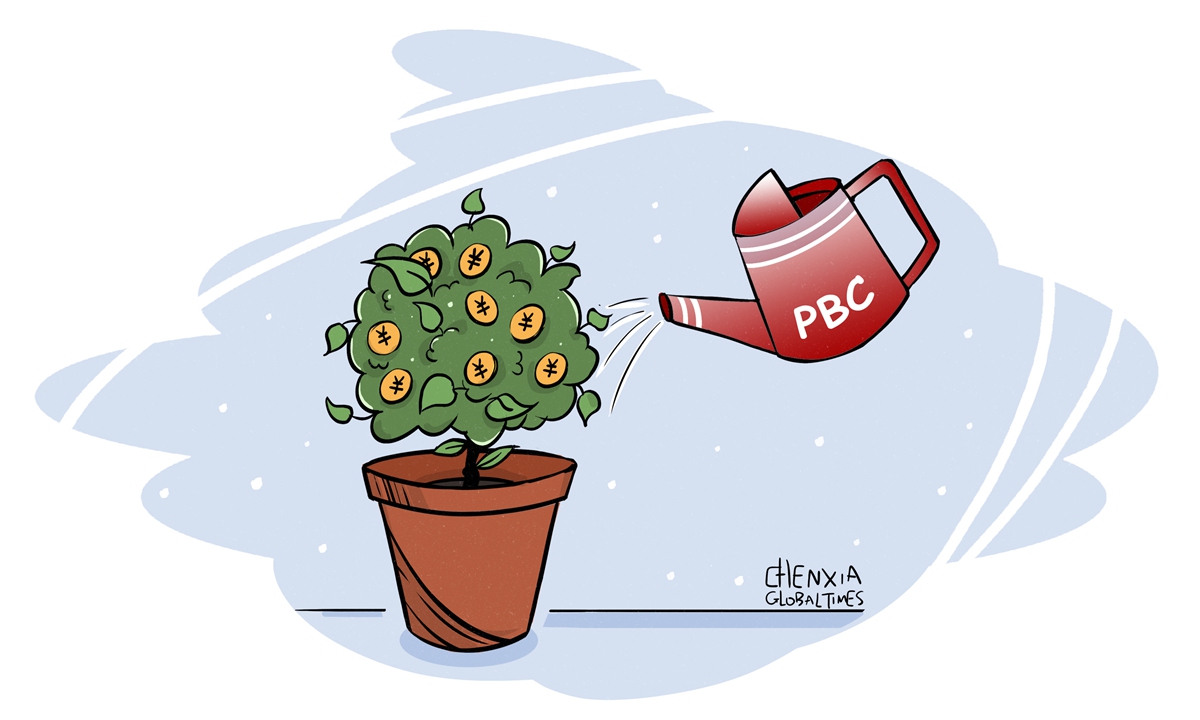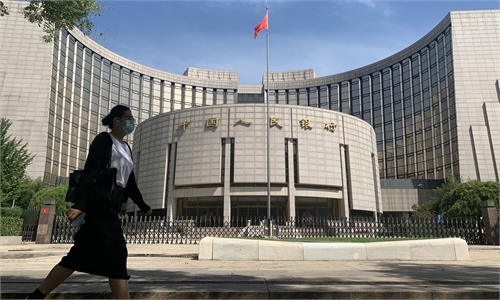
Illustration: Chen Xia/Global Times
It comes as no surprise that some Western media outlets are good at smearing the Chinese economy. They claimed on Tuesday that China's central bank unexpectedly reduced a key interest rate as the "economy signals a sharper downturn."However, although challenges remain, what is undeniable is that the Chinese economy has been steadily recovering of late. China has a sufficient tool kit to maintain a stable level of economic growth.
The People's Bank of China (PBC) on Tuesday cut the interest rates of the medium-term lending facility (MLF) and reverse repos, as part of efforts to strengthen counter-cyclical adjustment. The central bank's latest interest rate cuts can effectively reduce financing costs for the real economy, promote the recovery of credit demand, and stimulate consumption and investment.
China is endowed with the necessary economic conditions to cut interest rates, as the country was able to cap inflation at zero in June and -0.3 percent in July. On the contrary, inflation has gripped economies around the world.
In the US, inflation rose in July after 12 straight months of declines, boosted by costlier housing. Against the backdrop of high inflation, interest rate cuts are rare in the world.
This might create this false impression that the Chinese economy has encountered serious difficulties, and interest rates must be cut to drive growth. However, what is true is that while the US and many other economies have been forced to raise interest rates in order to tame inflation, China has the flexibility to take a divergent move to cut rates to jump-start economic growth.
Of course, the country faces many challenges, such as the weakening global economic recovery and unbalanced domestic development. Many new problems emerging in the first half of this year have complicated macro-regulation. But in recent years, China has insisted on implementing a steady monetary policy, leaving sufficient policy space and tools in reserve to cope with new challenges and unexpected changes.
Cutting interest rates will help boost capital demand in the real economy. While downward pressure remains for the Chinese economy, there are also growing signs that the economic recovery from the three-year pandemic is still underway.
The manufacturing purchasing managers' index in July increased by 0.3 points from June to 49.3, showing that business confidence is picking up. The substantial interest rate cut this time will support the confidence of enterprises and consumers, and the financing demand of the real economy is expected to recover steadily.
The cut of the MLF interest rate is expected to help drive the following cut of LPR interest rate, helping reduce corporate and mortgage interest rates, and promoting the recovery of the real estate sector.
Much of the focus of Western public opinion on the economy seems to be on differences of a few percentage points in GDP, but they do not understand the actual operation of the economy. In the first half of the year, intensive visits by top executives from well-known Western companies cast light on the importance that they attach to the Chinese market.
Many global business leaders are increasingly pinning their hopes on China to drive global growth and help the world economy avoid a broader recession in 2023.
What China needs most is confidence. Tuesday's rate cuts demonstrate the government's determination to support the economy. Although the market had expected the PBC to cut interest rates recently, the two rate cuts in one day and the size of the rate cuts still largely exceeded market expectations - especially for the MLF, which was the largest since the outbreak of the COVID-19 pandemic in 2020.
This fully shows China's determination to ensure stable economic growth. China still has many policy options in its toolbox, which should be considered vital to promoting sustained economic recovery.
The author is a reporter with the Global Times. bizopinion@globaltimes.com.cn


